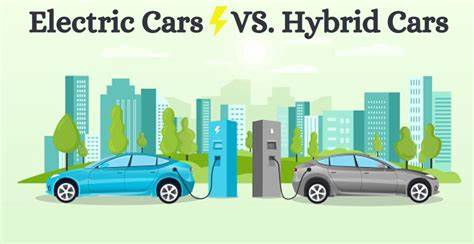The automotive industry has experienced a transformative shift over the past decade, with electric vehicles (EVs) and hybrid cars becoming mainstream choices for eco-conscious consumers. As we enter 2025, both options offer compelling benefits, but choosing the right one depends on your lifestyle, budget, and priorities. Let’s dive into the differences and help you make an informed decision.
Technology:
Electric Cars: Fully electric vehicles rely solely on batteries and electric motors. They produce zero emissions and offer a whisper-quiet ride. Modern EVs boast significant technological advancements, such as improved range and fast-charging capabilities.
Hybrid Cars: Hybrids combine a traditional internal combustion engine (ICE) with an electric motor. They switch seamlessly between the two power sources to optimize fuel efficiency and reduce emissions.
Performance:
Electric Cars: Known for instant torque, EVs deliver exceptional acceleration and smooth performance. Many models rival or surpass traditional sports cars in speed.
Hybrid Cars: While hybrids are efficient, their performance is typically less dynamic than EVs. However, they excel in versatility and adaptability for long-distance travel.
Environmental Impact:
Electric Cars: Emit no tailpipe emissions and are the greener option, especially when charged with renewable energy.
Hybrid Cars: While hybrids reduce emissions compared to traditional vehicles, they still rely on gasoline, making them less environmentally friendly than EVs.
Cost:
Electric Cars: Higher upfront costs but lower long-term expenses due to minimal maintenance and fuel savings.
Hybrid Cars: Generally more affordable initially but can incur higher operating costs over time compared to EVs.
Popular Car Models in 2025
Tesla Model 3 (EV): A best-seller known for its impressive range, cutting-edge technology, and sleek design.
Toyota Prius (Hybrid): A pioneer in hybrid technology, offering reliability, efficiency, and affordability.
Hyundai Ioniq (Available in EV, Hybrid, and Plug-in Hybrid): Versatile and feature-packed, catering to a wide audience.
Charging Infrastructure
In 2025, charging infrastructure has significantly expanded:
Electric Cars: Public charging stations are now widely available, with ultra-fast chargers providing 80% charge in under 30 minutes. Home chargers remain a convenient option for EV owners.
Hybrid Cars: Charging is not a concern for standard hybrids, but plug-in hybrids (PHEVs) benefit from the growing charging network.
Maintenance and Long-Term Costs
Electric Cars: Fewer moving parts mean less maintenance. Battery replacement remains a concern but is becoming less frequent with advancing technology.
Hybrid Cars: More components (ICE and electric motor) require regular servicing, potentially leading to higher maintenance costs over time.
Conclusion
Choosing between an electric car and a hybrid in 2025 depends on your individual needs:
- Electric Cars: Ideal for city dwellers, tech enthusiasts, and those with access to reliable charging infrastructure.
- Hybrid Cars: Better suited for drivers who frequently embark on long road trips or live in areas with limited charging options.
Both EVs and hybrids represent significant steps toward a sustainable future. Assess your driving habits, budget, and local resources to decide which vehicle type aligns with your lifestyle.



